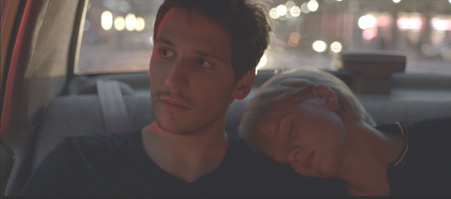The latest offering from French director Mia Hansen-Love is a decades-long story based on the experiences of her brother making his way through the Paris proto-electronic dance music scene throughout the 1990s and 2000s. (He co-wrote the script.)
Picture a sequel to Boyhood. Imagine following an 18-year-old adorable hipster as he comes into his own as a bourgeois city kid interested in art and culture, gains a foothold in the club scene, makes some real contributions as a DJ but is ultimately not recognized much for his efforts, and wakes up one day 15 years later at the end of the trip without a plan in the works. Now imagine the duo Daft Punk are his friends. That’s a reasonable description of the film.
It begins with the fictional Paul (Félix de Givry) at the tail end of high school, comfortably embedded in a hip music scene, and takes him on an upward trajectory. Masses of young people flock to parties where he and his friends are developing their own fashionable blend of house music. As is typical with films about musicians, the wave crests, and Paul experiences a personal recession, watching friends around him either grow up or get pulled into the quagmire of drugs and depression that accompanies their nocturnal party lifestyle. Sustaining the protracted time period, the filmmakers and cast successfully transform Paul and his peers from spry teenagers to aging men in a matter of two hours.
In many ways, Hansen-Love directs the film with the same approach as in her previous works (Goodbye First Love). It is unsensationalized, and depicts Paul’s life events from an observant, detached perspective, while the movie moves in a syncopated rhythm through the decades. Events happen on a timeline without predictable stopping points as a result. A bit of animation in the opening and the inclusion of chapter headings (“Lost in Music”), though, add a formal framework that one might not expect from this director.
Though the title may refer to the idyllic Garden of Eden as if it were a part of the characters’ background, the film’s not a fall from grace story but more like a movement away from the myth of unrestricted youth and toward the worldly responsibilities of adulthood. Additionally, the chapters serve as a reminder that we’ve seen such belated coming-of-age tales before. A musician has a dream, gets a break, experiences the highs, sees the end coming, and with it, inevitably, come the lows. The overall tone is something like a Holy Ghost! video, but not quite. The addition of a spot-on soundtrack and beautiful dance club photography make this a trippy, vicarious experience.
The recurring gag of the appearances of Daft Punk (played by Vincent Lacoste and Arnaud Azoulay) might on its own be a reason to see the film. They appear throughout on the outer ring of Paul’s circle as a shy and soft-spoken pair that has trouble getting into clubs and parties when using their real names and not donning their trademark space helmets. Early on at a house party, the two premiere a signature hook during their DJ set (“Da Funk”), and we in the audience are treated to that same dopamine-inducing moment of revelation that all ravers are in constant search of. Even if you’ve never heard their music, which is probably impossible, you’ll be hard pressed not to feel it, too.

















Leave A Comment